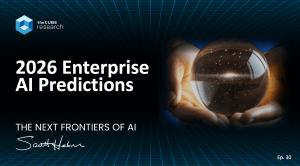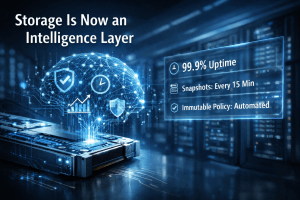Google Cloud Next 2025 delivered a strong signal to the industry: agentic AI isn’t a distant vision—it’s here, it’s enterprise-ready, and it’s rapidly redefining how organizations build, deploy, and operate applications at scale. From breakthrough enhancements in Vertex AI and Kubernetes to cross-platform agent interoperability and an increasingly cohesive security model, Google Cloud used this year’s event to showcase a clear vision: enabling a future powered by intelligent, context-aware, and highly autonomous AI ecosystems.
At theCUBE Research, we closely tracked the announcements and engaged directly with practitioners and partners to decode the implications for application development, enterprise IT, and the evolving AI stack. Below is our analyst summary and curated coverage of the event’s most significant developments.
Agentic AI Takes Center Stage
The theme of this year’s event was the rise of agentic AI—intelligent agents that can reason, act independently, and collaborate with other agents or systems to deliver outcomes. In our article “Building the Industry’s Best Agentic AI Ecosystem with Partners,” we explored how Google is leveraging its ecosystem—from hardware to software to strategic partnerships—to make agentic AI real for enterprises. Google’s AgentSpace, Gemini integrations, and the broader developer experience reflect an intentional shift from model-centric AI to outcome-driven systems.
This shift was most evident in the Agent2Agent (A2A) launch, which allows secure, governed, and composable communication between AI agents. This is a foundational step toward interoperable, scalable, and industry-compliant AI, especially in regulated sectors like healthcare, finance, and defense.
Vertex AI as the Engine of Enterprise Intelligence
Google continues to refine its enterprise AI platform with Vertex AI, positioning it as the foundation for building multi-agent systems and orchestrating complex AI workflows. The release of Gemini 2.5 added long-context reasoning, high-fidelity multi-modal capabilities, and tighter enterprise controls—all essential for moving beyond simple chat experiences into true enterprise-grade AI workflows.
Further extending the power of Vertex AI, Google announced new tooling for creative professionals in Veo 2 and Imagen 3, and for developers building AI-native apps with Firebase Studio and integrated Gemini developer tools.
Developers and Startups Get a New Launchpad
One of the most exciting aspects of Google Cloud’s strategy is its support for startups and developers building AI-first products. In our coverage of global startup momentum, we explored how Google Cloud is becoming the default launchpad for emerging AI companies, from infrastructure and APIs to distribution and co-selling.
For developers, the experience is becoming increasingly cohesive. Google introduced an application-centric AI-powered cloud experience that combines real-time observability, AI-powered debugging, and intelligent resource optimization, designed to help developers go from prototype to production faster than ever.
Bringing Gemini On-Premises: AI for Every Environment
While much of the AI innovation is cloud-native by default, Google recognized the importance of hybrid and on-prem environments. With the introduction of Gemini and AgentSpace on-premises, Google enables enterprises to run AI agents within secure environments while maintaining interoperability with cloud-native services. This is especially critical for organizations with data sovereignty requirements or legacy infrastructure constraints.
Security and Compliance Evolve with AI
In parallel with AI advancements, Google made a clear commitment to enhancing trust, compliance, and safety. The debut of Google’s unified AI and cloud security model ensures that innovations in agentic AI are governed by policy controls, threat detection, and enterprise-grade monitoring. This is essential as enterprises scale usage of multi-agent systems that make autonomous decisions and access sensitive data.
Rethinking Customer Engagement with AI
A standout moment from the event was the launch of Google’s AI-powered Customer Engagement Suite, which reimagines how brands can create hyper-personalized, proactive interactions across channels. Backed by Gemini and powered by real-time contextual insights, this suite offers marketers and service teams new ways to boost customer loyalty and business outcomes.
Scaling with Kubernetes: The AI Superpower
No discussion of Google Cloud would be complete without Kubernetes—and this year, GKE played a starring role in AI scalability. As we covered in “Kubernetes: Your AI Superpower,” new enhancements to GKE are purpose-built for AI workloads. From GPU scheduling to multi-agent orchestration, Google Cloud uses Kubernetes as a programmable substrate to support AI innovation across industries.
Unlocking the Future of Application Development
The total of these announcements reveals a coherent, developer-centric, and enterprise-aware roadmap for the future of application development. In our complete analysis, “Google Cloud Next 2025: Unlocking the Future of Application Development with AI and Kubernetes”, we laid out how Google Cloud is uniquely positioned at the intersection of cloud, data, AI, and application modernization. This event proved that Google isn’t just adding AI to existing products—it’s re-architecting the cloud to support the AI-native future.
Final Thoughts
As enterprises seek to differentiate through AI-driven experiences and developers demand more intelligent, composable tools, Google Cloud Next 2025 delivered on both fronts. This year’s event signaled a maturation of the AI era, from multi-agent orchestration to ecosystem interoperability, from developer velocity to data trust, and Google’s firm stance at its center. Stay connected with us at theCUBE Research for ongoing analysis of agentic AI, enterprise modernization, and cloud-native architecture.



